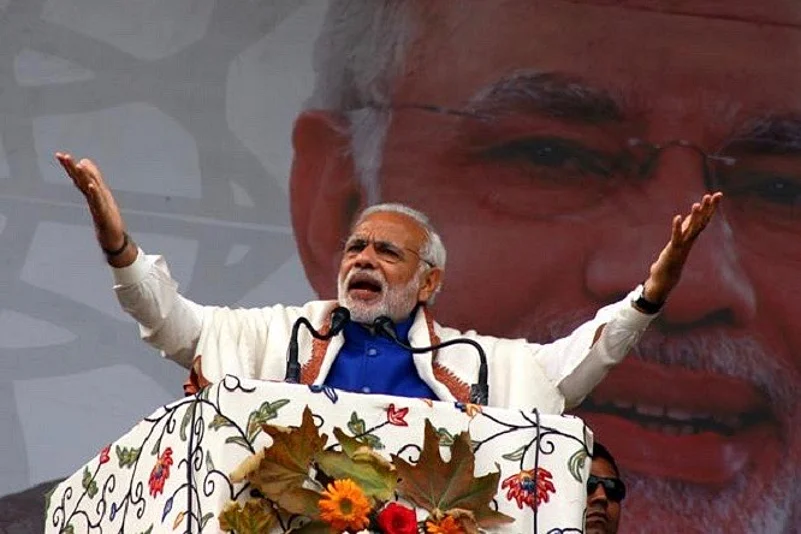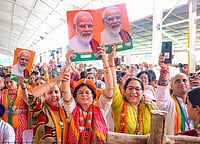Symbolism propels perception and can act as a propellant when the perception is built on nationalism. Taken together these three to a large extent form the matrix of the 2019 Indian parliamentary elections, especially of the BJP.
It’s probably for this reason that Prime Minister Narendra Modi has picked up Akhnoor in Jammu as one of the three places to kick-start his election campaign on Thursday.
About 30 km from Jammu city, Akhnoor is on the edge of where the Line of Control begins and about 100 km from Lam in Nowshera district, where India shot down a Pakistani F-16, which fell on the Pakistan side on February 27.
The Jammu-Poonch parliamentary seat, won by BJP MP Jugal Kishore Sharma in 2014 with a record 2.26 lakh votes, goes to poll on April 11. Modi has picked this constituency in his first leg of the campaign for more than one reason.
This parliamentary seat comprises of Muslim-majority border districts of Rajouri and Poonch. They are consistently bearing the brunt of cross-border firing. In the past, they suffered because of terrorism, but separatism and pro-Pakistan sentiment never got traction. It fits perfectly with Modi's slogan of "Saab ka Saath, Sab ka Vikas".
Prime Minister Narendra Modi during his last visit to the state on February 3, 10 days before the Pulwama attack and subsequent Balakot airstrike, while addressing a gathering in Srinagar, said rifleman Aurangzeb, a resident of Poonch, killed by terrorists in Kashmir while proceeding home for Eid last June, is the real "hero” of Jammu and Kashmir. His father recently joined the BJP.
The pro-India sentiment, which can be construed as nationalism, in Jammu runs counter to the pro-Azaadi, pro-Pakistan, pro-jihad sentiment in Kashmir. Pakistan's sinister game plan has equally affected Jammu and Kashmir regions of the state but in different ways.
Kashmir has suffered heavily due to Pakistan-sponsored terrorism while Jammu region is the worst victim of cross-border firing. Since the February 26 Balakot airstrike, four civilians and six army personnel have died along the LoC in Rajouri and Poonch area in Pakistani firing, with hundreds migrating for safety.
The state's matrix, with two distinct submatrix, fits into Modi's political matrix, of nationalism, zero-tolerance for separatism and going hard on both terrorism and Pakistan.
Modi's address is not only being keenly awaited in Jammu and by the BJP for electoral prospects but is much anticipated in Kashmir which probably for the first time is seeing hard arm-twisting measures against anti-India forces.
Former Prime Minister, late Atal Bihari Vajpayee, in his address from Srinagar in April 2003, had extended the 'hand of friendship' to Pakistan. Post-Balakot it will be Prime Minister Modi's first address in J&K which surely will be equally watched by the neighbour across the border. It's highly unlikely that Modi will repeat the Vajpayee moment.
However, the tone and tenor of his speech here will not only define the BJP's post-Balakot political speech for electioneering but also spell out the broad contours of the Government of India's Kashmir policy if he is to be elected again.
In 2014, in his first rally as the prime ministerial candidate in Jammu city, Modi had called for a debate on the relevance and utility of Article 370. Five years down the line, after the surprise visit to Pakistan and allying with PDP, Modi probably realising the futility of a 'soft approach' has decided to strike "hard".
The blueprint of events unfolding in J&K, like the ban on Jamat-e-Islami and Jammu Kashmir Liberation Front (JKLF), was broadly spelt out in Modi's last Srinagar address where he said the government will “break the backbone” of terrorism. Though, it gained momentum post-Pulwama.
It has gone down quite well in Jammu region which probably for the first time is having a sense of governing of the state since the imposition of first Governor's and then President's rule. Though, the Valley views it differently with a sense of “disempowerment”.
Modi though consistently vouching to carry forward Vajpayee's reconciliatory approach on Kashmir, but with a difference of de-hyphenating Kashmir and Pakistan. He in a sense has put political weight more behind Jammu than Kashmir.
In his last address at Srinagar, Modi talked about “Khushaal and Shaant Kashmir” (prosperous and peaceful Kashmir). Modi's Jammu address will be watched more for these two commitments and how J&K plays out into the party's electioneering pitch.






















.png?w=200&auto=format%2Ccompress&fit=max)



